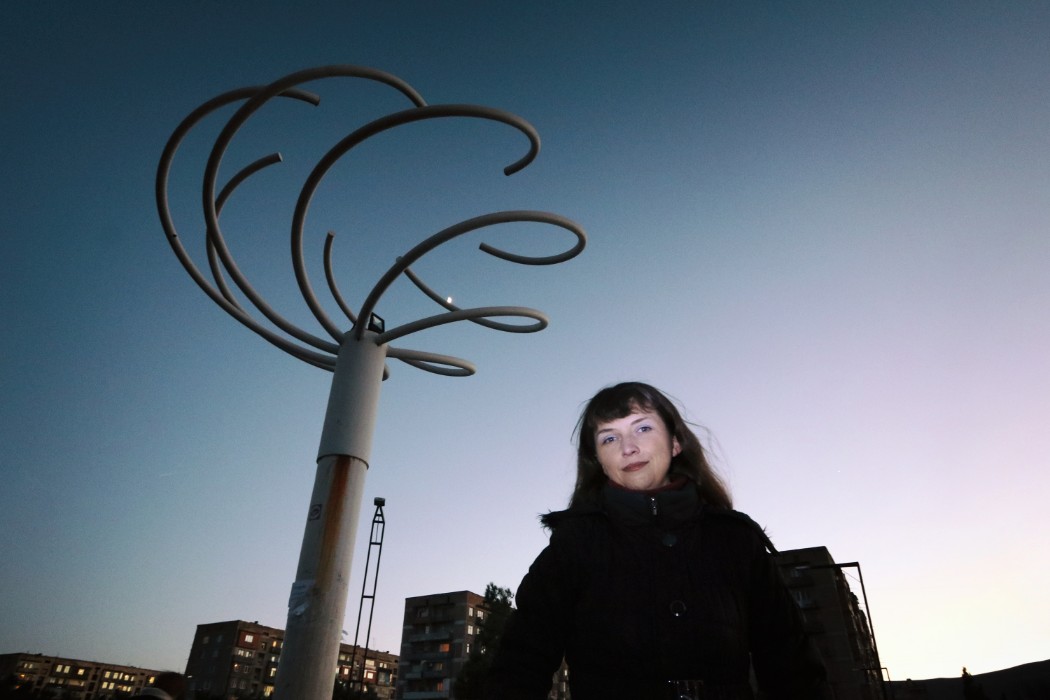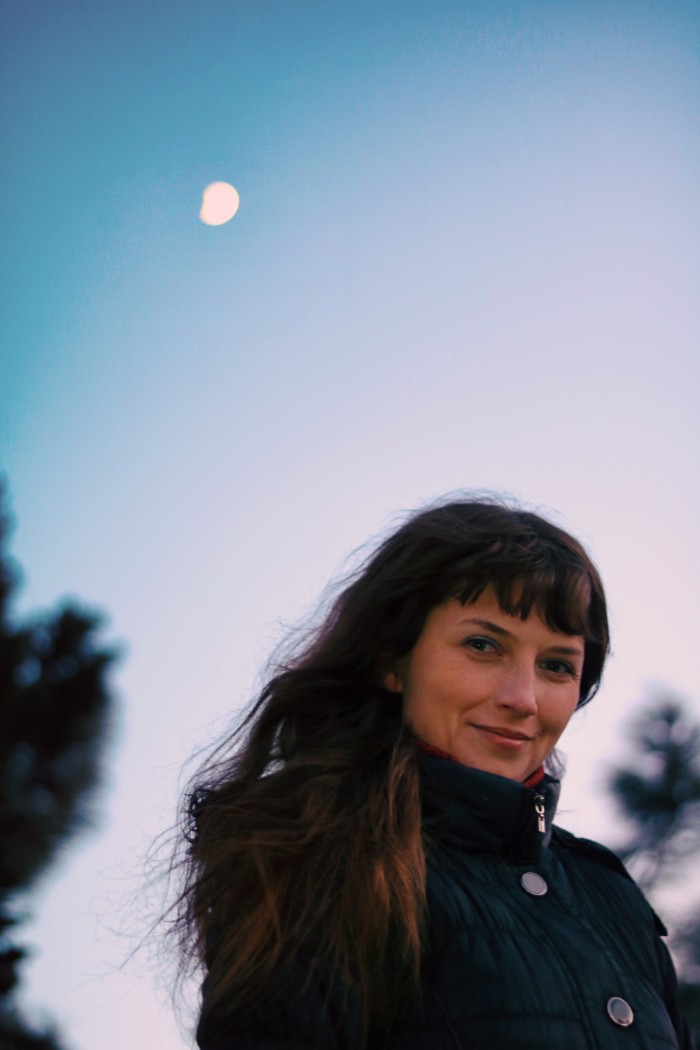Olgha Kalina, 33, Rustavi
“Let me start my story with a few words about my condition: I have paranoid schizophrenia. I was diagnosed at the age of 21, when I was a university student. I have always dreamed of a scientist’s career, and I was especially interested in biology. In addition to undergraduate studies I used to go to the lab so that I had better chances of pursuing my career. Back then, in the 90s, the economic situation in the country was far from stable; what is more, my father passed away and I lost support of my family other than very little cash for travel expenses and, frequently, I had to study under miserable conditions. Once I went to a conference on foot. I live in Rustavi, the conference was held in Tbilisi and I walked on the frozen slippery road for two hours. I thought I would never get there. I guess nobody had it easy at the time, but I was still an exception, plus I am a national minority and I struggled with the Georgian language as I was not very social, had to read only Russian books and there were no TV shows readily available… In a nutshell, I found it very difficult to connect and communicate with others. I am emphasizing all this, because such environmental triggers are risk factors that may lead to developing certain problems. Every individual is susceptible to an array of psychological and social factors and they need to be considered along with genetic predisposition and biochemical reactions. In my case, the illness was caused by the environmental triggers I mentioned above. I studied at the university and I started to feel discouraged – I had a feeling I would not be able to achieve my objectives. I was already a Master’s student when I realized that there is no further path for me. They tried to me to Moscow to continue studies but because of financial difficulties it was impossible. It was a big stress for me, quickly resulting in the mental condition that drove me to a psychiatric institution, even if only for a short period of time. After that, I had to take psychotropic medications. I had always been proud of my mental abilities and the fact that I could not control and use my mind, came as a crushing blow.
On the other hand, when I ended up in a psychiatric institution, I was shocked at the rampant human rights violation. The institution posed as a hospital, but the information about, say, your location, rights, illness or treatment was not openly available. As far as I know, the patients are not informed properly even today. There was no monitoring and the conditions were unbearable. For instance, there was no light in the bathroom; it was filthy and crawling with lice. Also, one young boy passed away unexpectedly and one of the nurses who was kinder than others and helped us, said the boy had died because of psychotropic drug overdose. In another case, the doctor demanded prepayment from my mother when she said she wanted to take me away from the hospital and many other cases… there were a lot of problems and we were not protected in any way.
 For half a year I was in a stupor. I generally need to sleep a lot, but after psychotropic medications, I was sleepy all the time. I still went to the university thanks to my friends who helped me with my thesis. The realization that I had lost my standing and authority in the family, I had lost all my confidence was horrible. I started to think, maybe, after all, they were right and I should not have aimed high, all I needed was to live a modest life and get married. I had led a different life before, and I had believed it was the right way. However, after this blow, I was not so sure any more. I clung to my mother, I did everything as others told me to, I even let other people pick clothes for me.
For half a year I was in a stupor. I generally need to sleep a lot, but after psychotropic medications, I was sleepy all the time. I still went to the university thanks to my friends who helped me with my thesis. The realization that I had lost my standing and authority in the family, I had lost all my confidence was horrible. I started to think, maybe, after all, they were right and I should not have aimed high, all I needed was to live a modest life and get married. I had led a different life before, and I had believed it was the right way. However, after this blow, I was not so sure any more. I clung to my mother, I did everything as others told me to, I even let other people pick clothes for me.
It lasted quite long. Once, there was a conference in Tbilisi and I was asked to make a speech. I am usually very nervous before presentations, and that time I was so worried that I went to a psychiatrist in a dispensary and asked for anxiety medication to stop me from worrying so much. Back then I still had trust in psychiatrists. This one doubled my dosage of medications. I was already apathetic because of the drugs and I realized that I would not be able to leave home after such dosage. When I shared my concern with the psychiatrist, this person replied indifferently: “You are sick. What did you expect?! You’re not supposed to read books. Go and help you mother in the kitchen.” That’s right, when it comes to women with disabilities, gender stereotypes go unchecked. To make a long story short, not only I started to doubt the doctor’s competence, but I finally realized that that the doctor couldn’t care less about the patients, so I decided not to blindly follow what I was told to do. I stopped taking medications. It is a rather dangerous step and I know a few people who have ended up being completely disabled. If you abruptly stop taking drugs, it’s very, very bad.
 In half a year, my body was more or less free of medications and I started writing rhymes, even a long poem, which means that the brain started functioning again, my analytical and reasoning skills were back. Then I decided that I have to keep working at the theory I had previously developed in biology. When I resumed my work, my mind was overburdened and I developed psychotic disorder again. I had to be placed in another psychiatric institution, with slightly better conditions, but still plagued with little or no information available, again patients helping one another, again cold in the building, patients trying to get warm by lighting fire of rubber shoes and getting intoxicated; as well as forced treatment, or injections administered in the presence of other patients, before their eyes, not caring about your sense of shame and dignity.
In half a year, my body was more or less free of medications and I started writing rhymes, even a long poem, which means that the brain started functioning again, my analytical and reasoning skills were back. Then I decided that I have to keep working at the theory I had previously developed in biology. When I resumed my work, my mind was overburdened and I developed psychotic disorder again. I had to be placed in another psychiatric institution, with slightly better conditions, but still plagued with little or no information available, again patients helping one another, again cold in the building, patients trying to get warm by lighting fire of rubber shoes and getting intoxicated; as well as forced treatment, or injections administered in the presence of other patients, before their eyes, not caring about your sense of shame and dignity.
I was discharged in one month. Patients were very interesting people, we understood one another well and I received a huge support from them. I tried to repay with kindness – one of the girls had property related problems and as soon as I was discharged, I tried to find an attorney for her. I contacted a non-governmental organization specializing in human rights. They were very interested in me and after some time asked me if I would go to a seminar in Great Britain, as they were looking for someone who could speak English and had this condition. In the beginning I panicked but I said yes and left for GB. It was a series of seminars so I had to travel there three times. This is where I felt myself a full-fledged human being and the process of my rehabilitation started practically without any help from psychologists, social workers and others. I was just lucky. I happened to be in an interesting place and I was revived. Then I received an offer from another NGO who needed someone with my condition to manage a new project. My Georgian was not so good back then and I feared I was not experienced enough, but I agreed anyway in an attempt to escape all the pressures I had suffered due to my social status. And now, I am facing a new stage and a big change in my life – I am involved as an expert in the National Preventive Mechanism team at the Ombudsman’s office. I go to prisons, isolation wards, shelters for senior citizens, orphan asylums, and psychiatric institutions and monitor them. In 2014, I was elected as a chairperson for the international network of people with psychiatric problems. I mean, I was just fortunate to realize my full potential, that is, I managed to solve difficult psychological and social conditions, and by doing so, remove environmental triggers from my life. As a result, I am not one of those very sick patients who need constant care. While I can function independently without the need of additional services, many people do need such services that, sadly, are not available in Georgia.”

